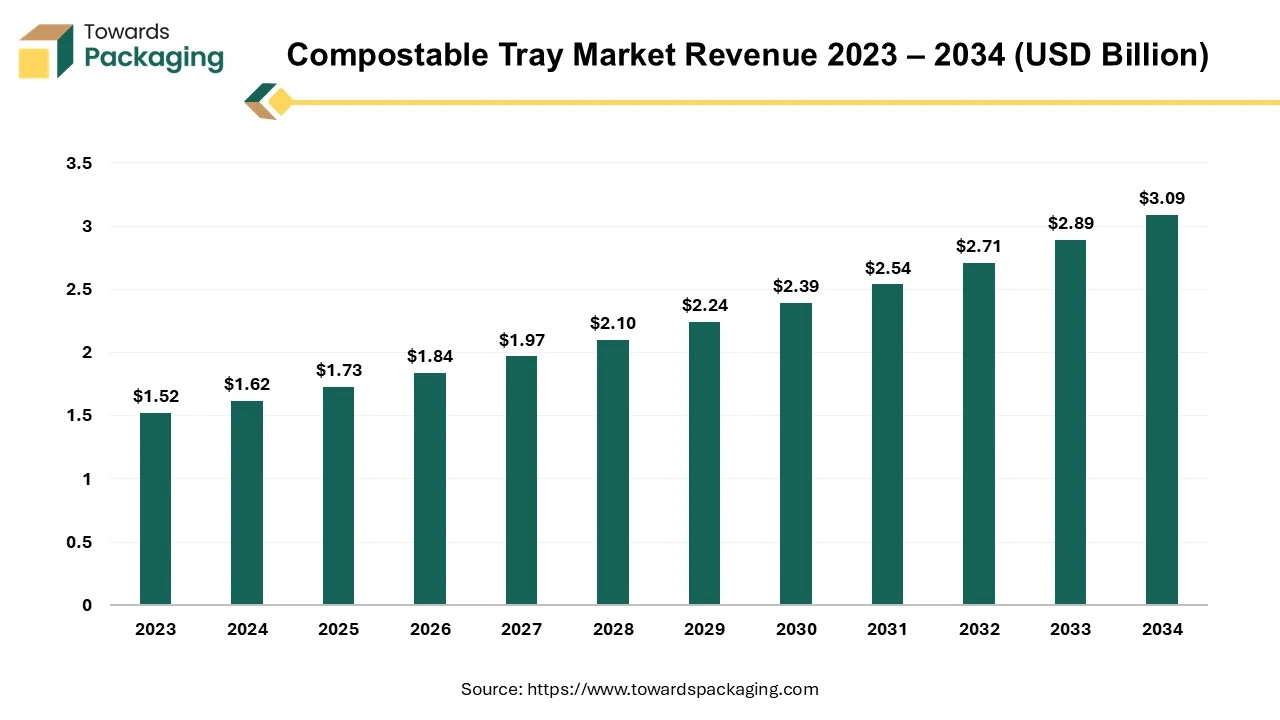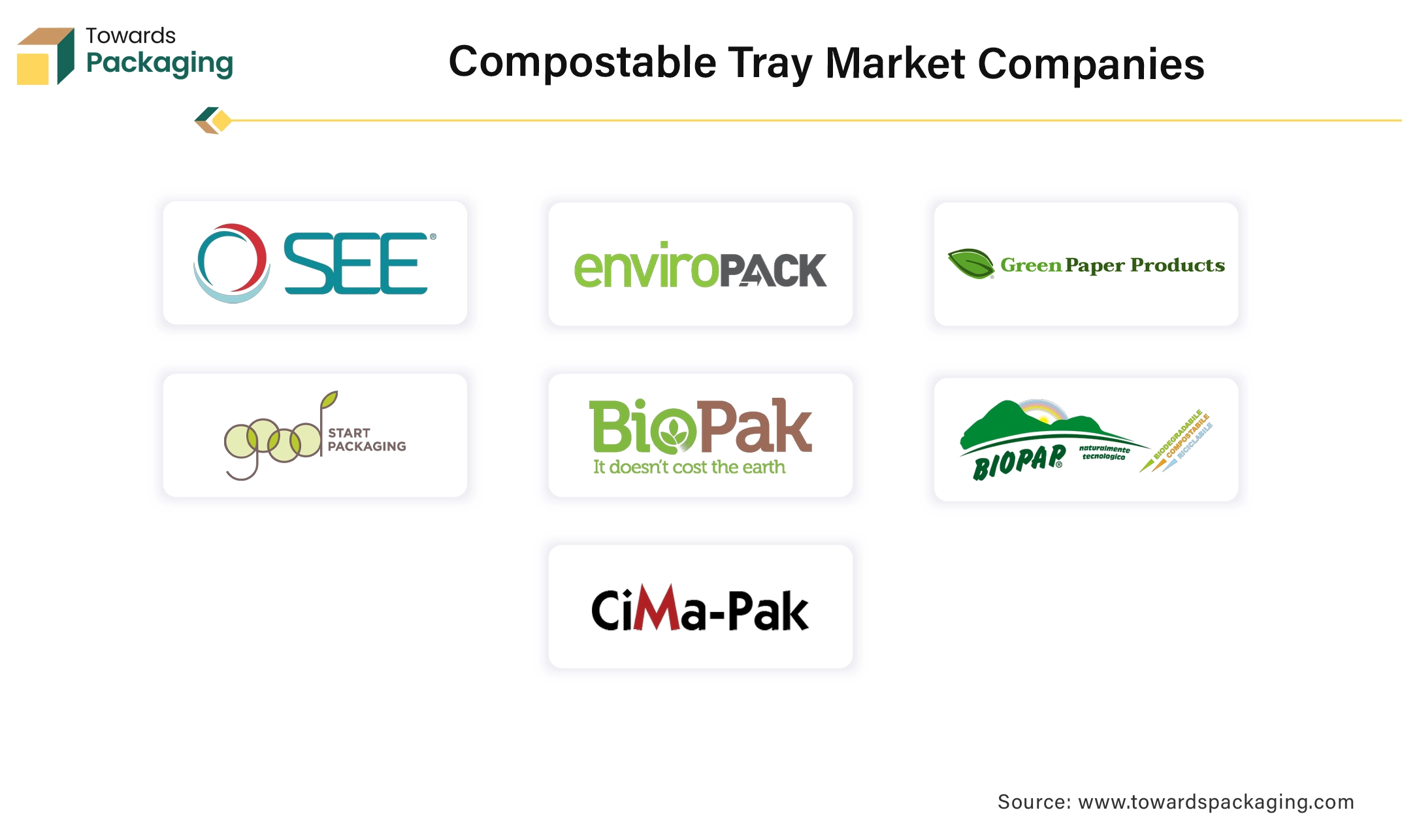February 2025
The compostable tray market is forecast to grow from USD 1.73 billion in 2025 to USD 3.09 billion by 2034, driven by a CAGR of 6.65% from 2025 to 2034.

Unlock Infinite Advantages: Subscribe to Annual Membership
The key players operating in the market are focused on adopting inorganic growth strategies like acquisition and merger to develop advance technology for manufacturing compostable tray which is estimated to drive the global compostable tray market over the forecast period.
Compostable trays are packaging products made from materials that can break down into natural substances in a composting environment. These trays are designed to decompose within a specific timeframe, usually within a few months, when exposed to moisture, heat, and microorganisms. The compostable trays are manufactured using biodegradable materials. They are often made from plant-based materials such as bagasse (sugarcane fiber), bamboo, or recycled paper.
The compostable tray minimize waste in landfills, contribute to soil health when composted, and often have a lower carbon footprint compared to traditional plastic trays. Compostable tray is commonly utilized for food packaging, takeout containers, and serving trays in restaurants and catering. Many compostable trays meet specific standards (like ASTM D6400 or EN 13432) that certify their compostability. Overall, compostable trays are an eco-friendly alternative to conventional plastic trays, supporting sustainability and reducing environmental impact. The global packaging industry size is growing at a 3.16% CAGR.
Due to busy lifestyle people are dependent on ready-to-eat meal as well online food delivery. Consumers are becoming more health-conscious and prefer products made from natural, non-toxic materials. The rise of the food delivery and takeout market increases the demand for convenient, eco-friendly packaging solutions. With China and the US predicted to be the top two markets, the online meal delivery industry is anticipated to expand in 2024. With a projected revenue of $43.78 billion in 2024, internet meal delivery is also anticipated to expand in India. Increasing regulations and bans on single-use plastics in various regions push food companies to seek compostable materials, which has estimated to drive the growth of the global compostable tray market over the forecast period.
The growing consumer preference for eco-friendly products is driving demand for compostable trays as alternatives to plastic. Increasing in adoption of the advanced technology for the production of compostable trays is estimated to drive the growth of the global compostable tray market in the near future.
Due to enhanced awareness and education around sustainability and composting practices are influencing consumer choices and increasing adoption. Food and ecommerce grocery companies are adopting sustainable practices to enhance their brand reputation and appeal to eco-conscious consumers, which is estimated to drive the compostable tray market in the near future.
More manufacturers and suppliers are entering the market, expanding the range of compostable tray products available. Development of advanced materials, such as plant-based bioplastics and fiber composites, is enhancing the performance and versatility of compostable trays. The key players operating in the market are focused on introduction of the new material compostable tray, which is estimated to create lucrative opportunity for the growth of the global compostable tray market.
The tray was developed as an alternative to those constructed of expanded polystyrene (EPS), which are routinely used to package fresh chicken and red meat for customer purchase but are neither recyclable nor biodegradable. It will decompose into organic material without leaving any harmful residue.
The key players operating in the market are facing strong competition from other alternatives due to low cost of other materials and difficulty in meeting the regulatory guidelines, which may hinder the growth of the compostable tray market over the forecast period. Compostable trays are often more expensive to produce than traditional plastic alternatives, which can deter some consumers and businesses. Many regions lack the necessary composting facilities to effectively process compostable products, leading to confusion about disposal. Consumers may not fully understand the benefits of compostable trays or how to properly dispose of them, impacting market adoption. Differences in regulations across regions can complicate compliance for manufacturers and lead to market uncertainty.
North America region dominated the global compostable tray market in 2024. Many companies in North America are adopting sustainable practices to enhance their corporate social responsibility profiles. Increased efforts in North America to educate consumers about the benefits of compostable products are promoting adoption. North American manufacturers are innovating to provide a wide range of compostable trays that meet various consumer needs. The North America region have well-developed composting facilities and programs, facilitating the effective processing of compostable products.
Asia Pacific region is anticipated to grow at the fastest rate in the global compostable tray market during the forecast period. Rising incomes in Asia Pacific region lead to greater consumer spending on sustainable products, including compostable packaging. Urbanization in countries like China and India creates new markets for sustainable packaging as lifestyles change. The growth of the food delivery and takeaway sector in Asia Pacific region boosts the demand for convenient, compostable packaging options.
The cardboard trays segment held a dominant presence in the compostable tray market in 2024. Cardboard is made from renewable resources and is biodegradable, appealing to environmentally conscious consumers and businesses. Generally, cardboard trays are less expensive to produce than many other compostable materials, making them a cost-effective choice for manufacturers. Cardboard trays can be used for a wide range of food products, from ready-to-eat meals to baked goods, enhancing their market appeal.
These materials are readily available and widely produced, ensuring consistent supply for manufacturers. Consumers are accustomed to cardboard packaging, making them more likely to choose products in cardboard trays over less familiar alternatives. Cardboard trays provide sufficient durability for most food items, including hot and cold foods, which is essential for food service applications. Many regions are moving away from plastic, and cardboard trays often comply with new regulations promoting sustainable packaging.
The restaurant segment registered its dominance over the global compostable tray market in 2024. People are increasingly preferring takeaway from restaurants for saving time. Takeaway allows customers to enjoy meals without the time commitment of dining in, making it easier for busy lifestyles. Ongoing health concerns and after Covid-19 pandemic have made many consumers prefer takeaway to minimize exposure in crowded dining settings.
Mobile apps and online platforms make ordering food more convenient, enhancing the takeaway experience. Many restaurants aim to reduce their environmental footprint, and using compostable trays aligns with eco-friendly practices. Using compostable trays can improve a restaurant's public image, showcasing its commitment to sustainability and attracting environmentally minded customers. The growing availability of innovative compostable materials allows restaurants to choose trays that meet their specific needs and aesthetic preferences.

By Type
By Application
By Region
February 2025
February 2025
February 2025
February 2025